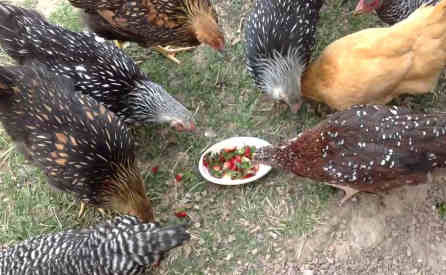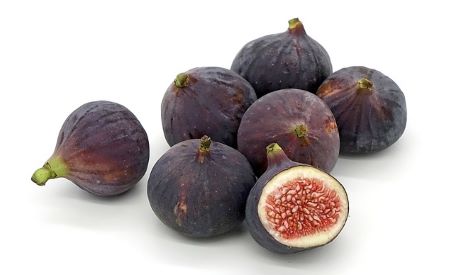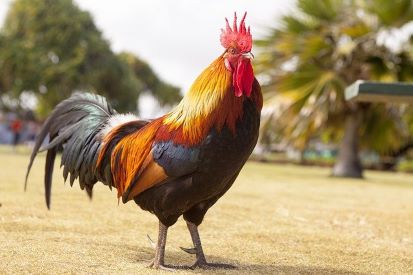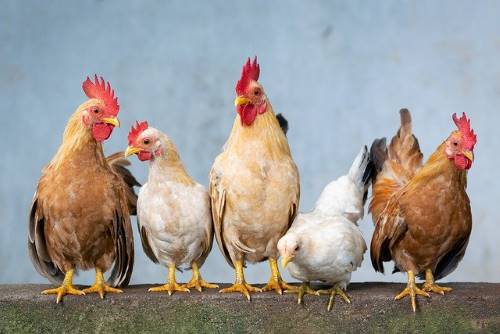Can chickens eat figs? Yes, chickens can eat figs. Figs are a good source of vitamins and minerals for chickens and can help boost the immune system. Chickens should only eat a small number of figs at a time and should be given fresh figs rather than dried ones.
Chickens are omnivores, which means they eat both plants and animals. This gives chicken owners a lot of flexibility regarding what they can feed their chickens. Figs are a good fruit for chickens, and they offer a lot of health benefits.
This article will cover everything you need to know about feeding figs to chickens, including the nutritional value of figs and how many figs chickens can eat.

Can chickens eat figs?
Figs are a type of fruit that chickens can eat. Chickens really enjoy figs! However, there are a few things to keep in mind when feeding your chicken figs. Figs are a very sweet fruit, so you should only give them to your chicken in moderation. A good rule of thumb is to only give your chicken a couple of figs at a time.
Additionally, it’s important to ensure that the figs you give to your chicken are fresh. Dried figs are much more concentrated in sugar, so you should avoid them.
[ChickenAffiliate]
The benefits of eating figs for chickens

When it comes to chicken feed, there are a lot of options out there. However, one option that is often overlooked is figs. Here are five reasons you should consider adding figs to your chicken’s diet.
Good source of fiber
Fiber is important for chickens because it helps them maintain a healthy digestive system. In addition, fiber helps chickens feel fuller for longer, leading to less pecking and fighting among birds.
Good source of vitamins and minerals
Chickens need vitamins and minerals for overall health and well-being. Figs are a good source of vitamins A, B, and C, as well as potassium and magnesium.
Can help with weight gain
If your chickens are underweight or you’re trying to get them to grow larger, adding figs to their diet can help. The extra calories in figs can help chickens put on weight without resorting to unhealthy methods like force-feeding.
Fig leaves can be used as natural pest control
If you have an infestation of pests like mites or lice, using fig leaves can help get rid of them naturally. Place some dried or fresh fig leaves in the chicken coop; the pests will be gone in no time.
Figs taste great
Chickens love the taste of figs, so feeding them this fruit is a great way to keep them happy and healthy at the same time. Plus, they’ll be excited to see you when you bring them their favorite treat.
Things to watch out for when feeding figs to chickens
You need to watch out for a few things when feeding figs to your chickens. Here are three things to keep in mind.
Pesticides
Figs are on the list of fruits and vegetables most likely to be sprayed with pesticides. So, if you’re feeding your chickens fresh figs, wash them thoroughly.
Mold
Figs are a high-mold fruit, so it’s important to inspect them carefully before giving them to your chickens. Throw away any figs that show signs of mold or decay.
Sugar content
Figs are fairly high in sugar, so don’t overdo it when feeding them to your chickens. A few figs here and there as a treat is fine, but they shouldn’t make up a large part of your chicken’s diet.
How often should chickens eat figs?

Figs are a type of fruit that chickens can eat, but you should feed them in moderation. While figs are a good source of vitamins and minerals, they also contain sugar. Too much sugar can lead to weight gain and other health problems in chickens.
As a general rule, chickens should only eat figs on occasion. If you do feed your chickens figs, be sure to monitor their weight and overall health closely. You may need to reduce the number of other treats or snacks you give them if you notice any adverse effects.
How to prepare figs for feeding to chickens
Before you feed figs to your chickens, there are a few things you need to do to prepare them. Follow these simple steps, and your chickens will enjoy fresh figs in no time!
- Step one: Rinse the figs in cool water. This will remove any dirt or chemicals that may be on the skin of the fruit.
- Step two: Cut the figs into small pieces. This will make it easier for the chickens to eat and help them get the most nutrients from the fruit.
- Step three: Add the figs to your chicken’s regular food. You can mix them with their pellets or crumble or offer them as a treat in a separate dish.
- Step four: Enjoy watching your chickens enjoy their healthy snack!
By following these simple steps, you can easily prepare figs for feeding. So give your feathered friends a taste of this nutritious fruit.
Can baby chicks eat figs?
Can baby chicks eat figs? The answer may surprise you. Figs are a great source of nutrition for baby chicks. They are high in protein and calcium, essential for proper growth and development. In addition, figs contain antioxidants that can help to protect the chicks from disease.
However, it is important to ensure that the figs are chopped into small pieces before feeding them to the chicks. Otherwise, they may choke on the large pieces. So, if you’re looking for a healthy and nutritious treat for your baby chicks, give them a try. Just be sure to chop them up first.
What other fruits can chickens eat?

While chickens like to eat figs, they enjoy many other types of fruit. Let’s take a look at some of the other fruits that chickens like to eat.
Apples
Chickens can eat apples, but they should eat them in moderation. The main concern with feeding chickens apples is the seeds. Apple seeds contain amygdalin, a compound that breaks down into cyanide in the body. Cyanide is poisonous to chickens, so it’s important to remove the seeds before giving apples to your chickens.
Besides that, apples are a great source of vitamins and minerals for chickens. Just chop them up into small pieces, so your chickens don’t choke on them.
Read More: Can Chickens Eat Apples? 7 Excellent Benefits
Grapes
Grapes are an excellent source of vitamins and minerals for your chickens. They provide a great mix of antioxidants, which helps to keep their immune system healthy. Be sure to wash the grapes before giving them to your chickens, as pesticide residue may be present.
Read More: Can Chickens Eat Grapes? 6 Important Benefits
Pears
Pears are an excellent source of fiber and carbohydrates, which help to keep your hens strong and healthy. They also contain essential vitamins and minerals such as potassium, magnesium, zinc, and iron. Be sure to cut the pears into small pieces before feeding them to your hens.
Read More: Can Chickens Eat Pears? 5 Fantastic Benefits
Kiwi
Kiwis are packed with vitamin C, as well as other essential vitamins and minerals that help keep your chickens healthy. They also offer plenty of antioxidants which help boost their immunity against diseases. Just make sure you cut kiwis into small pieces before giving them to your hens so they don’t choke on them.
Read More: Can Chickens Eat Kiwi Fruit? 5 Amazing Benefits
Pomegranate
Pomegranates are one of the most nutrient-dense fruits out there and offer plenty of health benefits for your chickens. They’re rich in antioxidants which help boost immunity against disease as well as containing essential vitamins such as vitamin B6 and folate. It’s best to cut pomegranates into quarters before giving them to your hens so they don’t choke on the seeds inside.
There are many types of fruit that chickens enjoy eating. If you’re looking for a way to add variety to your chicken’s diet, consider giving them some of these different types of fruit.
Read More: Can Chickens Eat Pomegranate? 6 Awesome Benefits
How to give chickens a healthy and balanced diet
Chickens are omnivorous creatures, which means they enjoy a varied diet of plant and animal matter. In the wild, chickens will forage for seeds, insects, and even small reptiles or mammals.
However, when chickens are kept as pets or livestock, it is up to their owners to provide them with a nutritious and delicious diet.
While there are many store-bought chicken feeds available, creating a healthy and balanced diet for your chickens using items you may already have around the house is also possible. Here are some tips for how to do just that.
Fruit and vegetables
Chickens love fruit and vegetables, so feel free to get creative with what you feed them. Chickens’ most popular fruits and vegetables include watermelon, cantaloupe, grapes, strawberries, carrots, sweet potatoes, green beans, and peas.
You can feed your chickens these items fresh, frozen, or canned. Just be sure to remove any pits, seeds, or stems before doing so.
Grains
Grains should make up a large part of a chicken’s diet since they are an excellent source of carbohydrates and protein. The most popular grains among chickens include corn, oats, wheat, barley, and rice. You can feed your chickens these items raw or cooked.
If you choose to cook them first, be sure to let them cool completely before giving them to your chickens, as they can scald their tender throats if they eat them while they’re still hot.
Protein
In addition to the protein found in grains, you can supplement your chicken’s diet with other protein sources such as mealworms, earthworms, crickets, and other insects. You can find these items at your local pet store or online.
As with grains, if you choose to cook these items before feeding them to your chickens, let them cool completely first.
Can chickens eat figs – final thoughts
Chickens can eat figs, but there are a few things to remember.
Figs are very sweet, so only give them to your chicken in moderation. Additionally, ensure the figs are fresh – dried figs are much more concentrated in sugar and should be avoided.
Finally, remember that chickens need a varied and balanced diet to stay healthy. While figs offer many benefits, they should only be given to chickens as part of a well-rounded diet. All in all, figs make a great treat for your chicken!
Related Articles:
